Janice Hardy's Blog, page 52
March 12, 2020
Taking the First Step Toward Your Writing—Every Day
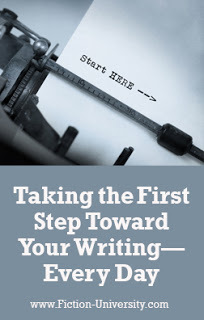 By Shanna Swendson, @ShannaSwendson
By Shanna Swendson, @ShannaSwendsonPart of The Writer’s Life Series
JH: Some days, it's just hard to get started when we sit down to write. Shanna Swendson share tips on taking that first step and keeping your writing momentum going.
Shanna Swendson earned a journalism degree from the University of Texas but decided it was more fun to make up the people she wrote about and became a novelist. She’s written a number of fantasy novels for teens and adults, including the Enchanted, Inc. series and the Rebel Mechanics series. She devotes her spare time to reading, knitting, and music.
Website | Twitter | Facebook | Goodreads
Take it away Shanna…
Continue ReadingWritten by Janice Hardy. Fiction-University.com
Published on March 12, 2020 04:46
March 10, 2020
6-Point Story Checklist for Powerful Scenes
 By Laurence MacNaughton, @LMacNaughton
By Laurence MacNaughton, @LMacNaughtonPart of the How They Do It Series
JH: The scene is the building block of the novel, and the stronger each scene is, the stronger the novel will be overall. Laurence MacNaughton shares his checklist for writing powerful scenes.
The hardest part about writing is getting started. Where should you kick things off? How do you make it exciting? How do you keep the momentum going? To find the answer, use this easy scene checklist. It walks you through everything you need to know to write a scene. Keep your notebook handy.
1. What does success look like to your character?
Every scene revolves around a character who wants something here and now. What does your character want?
Continue ReadingWritten by Janice Hardy. Fiction-University.com
Published on March 10, 2020 04:54
March 9, 2020
A Three-Step Plan for Returning to a Partially Finished Manuscript
 By Janice Hardy, @Janice_Hardy
By Janice Hardy, @Janice_Hardy Getting back to an old manuscript after a break is often harder than starting one anew.
Last week, I sent my new manuscript off to my agent (yay!). This was a bit trickier than usual, because I’ve been juggling two projects—revising this manuscript while drafting another. They’re completely different markets and genres (an adult science fiction and a middle grade fantasy) so there’s no cross-contamination of ideas or styles, but it did mean that after I received feedback on the adult novel, I had to give it most of my attention to meet my due date.
That left my poor little first draft languishing for two months while I revised the other manuscript. And after two months of ignoring it, it’s a little tough to just dive back in and start writing again.
Being away from a writing project for a while kills your momentum for that project.
Continue ReadingWritten by Janice Hardy. Fiction-University.com
Published on March 09, 2020 05:26
March 7, 2020
WIP Diagnostic: Is This Working? A Closer Look at a Puzzling Scene
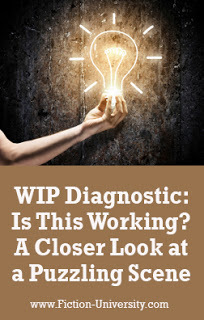 Critique By Janice Hardy, @Janice_Hardy
Critique By Janice Hardy, @Janice_HardyWIP Diagnostics is a weekly column that studies a snippet of a work in progress for specific issues. Readers are encouraged to send in work with questions, and we diagnose it on the site. It’s part critique, part example, and designed to help the submitter as well as anyone else having a similar problem.
If you're interested in submitting to WIP Diagnostics, please check out these guidelines.
Submissions currently in the queue: Zero
Please Note: As of today, critique slots are open.
This week’s questions:
1. Does it have enough internalization, description, or narration?
2. Am I showing, not telling?
3. Does the dialogue sound natural and believable?
4. Would you want to keep reading?
Market/Genre: Unspecified
On to the diagnosis…
Continue ReadingWritten by Janice Hardy. Fiction-University.com
Published on March 07, 2020 06:18
March 6, 2020
What's My Motivation? Tips on Showing Character Motivations
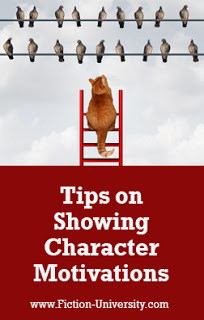 By Janice Hardy, @Janice_Hardy
By Janice Hardy, @Janice_Hardy Knowing what motivates a character to act not only makes for a great read, it also makes it easier to plot.
Understanding character motivations is a big part of plotting. Why your characters (especially your protagonist and antagonist) do the things they do determines how your plot unfolds, since they'll have reasons for choosing Option A over Option B.
Of course, showing those motivations without banging a reader over the head can be the hard part. Especially if the reasons aren't clear to the character.
While you don't have to know every single reason why your character does every little thing, if what they do affects the plot or story, it's a good idea to know why they did it. Otherwise, you might end up with a reactionary protagonist or a character who's just acting out plot, but doesn't really care about what happens. Those kinds of characters can leave a story feeling flat and lifeless.
Continue ReadingWritten by Janice Hardy. Fiction-University.com
Published on March 06, 2020 03:00
March 5, 2020
Successful Self-Publishing: Learn Your Craft
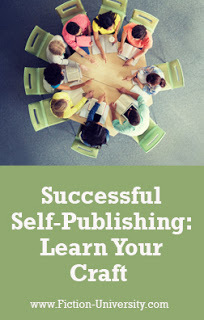 By Laurisa White Reyes, @lwreyes
By Laurisa White Reyes, @lwreyesPart of The Indie Authors Series
JH: Before you jump into publishing, learn how to write well. Laurisa White Reyes shares tips on things to do if you want a successful writing career.
Laurisa White Reyes is the award-winning author of seventeen books, including 8 Secrets to Successful Self-Publishing . She is also the founder and senior editor of Skyrocket Press and teaches English composition at College of the Canyons in Southern California. Visit her website at www.SkyrocketPress.com.
Website | Facebook | Twitter | Goodreads |
Take it away Laurisa...
Continue ReadingWritten by Janice Hardy. Fiction-University.com
Published on March 05, 2020 04:46
March 4, 2020
3 Reasons That "Perfectly Good Scene" Is Boring Your Readers
 By Janice Hardy, @Janice_Hardy
By Janice Hardy, @Janice_Hardy A weak scene doesn’t mean the end of your novel.
It’s a lot easier to spot a weak scene than a boring one. Weak scenes have problems that usually stand out, either to us, or to our critiquers or beta readers. But boring scenes? They like to hunker down and stay just enough under the radar to avoid revision, because they seem like a perfectly good scene. They work, but just not as well as they should.
How to Tell if Your Scene Is Boring Your Readers
This is tricky since we can’t loom over our readers and peek into their heads to know how they feel while they’re reading (wouldn’t that be helpful?). But we can ask our critique partners and beta readers to let us know when they start to skim a scene, or when a scene isn’t grabbing their attention.
Continue ReadingWritten by Janice Hardy. Fiction-University.com
Published on March 04, 2020 05:40
March 3, 2020
The Importance of Backstory (Or How the Brain Connects the Present to the Past)
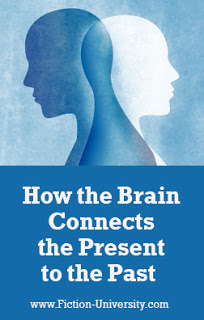 By Kassandra Lamb, @KassandraLamb
By Kassandra Lamb, @KassandraLamb
Part of the How They Do It Series
JH: Your character's emotional reactions stem from their backstories, and when those don't mesh, reader disconnects can happen. Kassandra Lamb explains how the brain can help us write stronger character backstories.
Kassandra Lamb is a retired psychotherapist/ psychology professor turned mystery writer. She is the author of the Kate Huntington Mysteries and the Marcia Banks and Buddy Cozy Mysteries, plus a non-fiction guidebook, Someday is Here! A Beginner’s Guide to Writing and Publishing Your First Book . She also writes romantic suspense under the pen name of Jessica Dale.
Her specialty as a psychotherapist was trauma recovery, and today she brings us her insights into how the brain connects our past to our present, and the implications for writers regarding characters’ back stories.
Website | Twitter | Facebook | Pinterest | Bookbub Profile | Goodreads
Take it away Kassandra…
Continue ReadingWritten by Janice Hardy. Fiction-University.com
Published on March 03, 2020 05:14
February 29, 2020
WIP Diagnostic: Is This Working? A Closer Look at a Romance Query Letter
 Critique By Janice Hardy, @Janice_Hardy
Critique By Janice Hardy, @Janice_HardyWIP is a weekly column that studies a snippet of a work in progress for specific issues. Readers are encouraged to send in work with questions, and we diagnose it on the site. It’s part critique, part example, and designed to help the submitter as well as anyone else having a similar problem.
If you're interested in submitting to WIP Diagnostics, please check out these guidelines.
Submissions currently in the queue: Two
Please Note: As of today, critique slots are booked through March 14.
This week’s questions:
I fear it reads more like a book cover blurb instead of a query. I'm not sure if I should bring in more to increase conflict but I am trying to sell a romance. Should I?
Market/Genre: Romance Query
On to the diagnosis…
Continue ReadingWritten by Janice Hardy. Fiction-University.com
Published on February 29, 2020 04:52
February 27, 2020
The Dangers of Chasing the "Blockbuster Novel" Dream
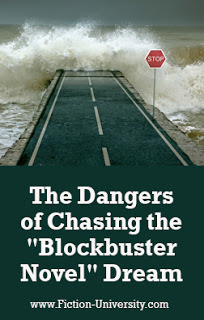 By Maggie Wells, @MaggieWells1
By Maggie Wells, @MaggieWells1Part of The Writer’s Life Series
JH: There's a lot about writing and publishing that's beyond a writer's control. Maggie Wells shares thoughts on one of them, and what we can do about it.
By day, Margaret Ethridge is buried in spreadsheets. At night, Maggie Wells pens tales of people tangling up the sheets. The product of a charming rogue and a shameless flirt, you only have to scratch the surface of this mild-mannered married lady to find a naughty streak a mile wide. Maggie has a passion for college football, processed cheese foods, and happy endings. Not necessarily in that order.
A hybrid author of 40 novels and novellas, Mags has been published with Sourcebooks-Casablanca, Kensington/Lyrical Press, Harlequin-E, and Carina Press. She is represented by Sara Megibow of kt literary.
Website | Twitter | Facebook | Instagram
Take it away Maggie…
Continue ReadingWritten by Janice Hardy. Fiction-University.com
Published on February 27, 2020 04:17



